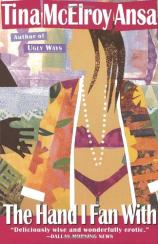About the Book
About the Book
The Hand I Fan With

"Janie saw her life like a great tree in leaf with the things
--Zora Neale Hurston, Their Eyes Were Watching God
Dear Reader:
On my way to the airport while promoting my second novel, Ugly Ways, I said to my husband, Jonée, that I knew my next novel would be a passionate, erotic love story, something I had wanted to write since reading my mother's adult contemporary novels as a child. I knew the main character would be Lena McPherson, the eponymous main character from my first novel, Baby of the Family. But, I told him, I di dn't know whom she was going to fall in love with. Jonée gave me this incredulous look and said, "Now, who else would Lena fall in love with but a ghost?"
I had to laugh. Of course, that's who would be Lena's love: a ghost.
(In fact, for a while before I settled on The Hand I Fan With as the title, I called the novel "Lena's Love" for reference purposes.) How perfect, I thought, how appropriate for an American love story at the end of the twentieth century to be as tenuous, as ephemeral, as insubstantial as trying to love a ghost.
Herman--what a perfect name!--began materializing right then for me, almost as he came to Lena. For Lena, Herman was perfect--a ghost, a spirit, a vapor of a man who could do anything earthly and unearthly, become any substance, hone himself into any shape and not even break a sweat. As a ghost, he could be any age, have any experience, have lived as a man and a spirit, and learned a few things in the process.
Herman is indeed a prodigious presence in the novel. But Herman has already been around--alive and dead--some 139 years. He's got his stuff together. It is Lena who is still a pupil, still growing, still learning, still living.
But despite Herman's presence, The Hand I Fan With is and always was Lena's story.
In The Hand I Fan With it was important for me to explore the issue of how one lives as well as how one loves. Not what clothes we wear or what car we drive, but how we live a full life on this planet. How we live a spiritual life in the midst of plenty or in the midst of deprivation. How we reach the balance of duty to others and self-fulfillment. How attachment to things and fixing and doing saps us of the joy of living. How it is possible to be a mother without giving birth or without formal adoption.
For this is a woman's story of giving too much to others without thought for self. It is the story of how many of us women live our lives in a rush of accumulating and sacrificing.
For me, writing a novel is an organic thing. It is a natural process. I wanted the eroticism of Lena and Herman's relationship to grow out of their everyday lives, from the succulence of the vegetables they eat from their garden to the joy of putting their bare feet to the earth. I wanted Lena to rediscover her roots, her culture, her land, her self, her past. And Herman, who was a part of Lena's cultural past, is her loving guide on this journey.
Much of the novel evolved that way: One image, one thought, one revelation grew out of another. I felt at so many times in writing The Hand that I, too, was on a journey of self-realization. I could not write about Lena's inability to say "No" and not catch myself having the same problem. After writing the berry-picking scene in the book, I could not let blackberry season come and go without also marking the occasion.
A mighty flood did indeed sweep through the center of Georgia in the spring of 1994, leaving confusion, destruction and change in its wake. And I knew that Mulberry would have had to be affected by the deluge, too.
In dealing with the traditionally erotic, the sexual element of Lena's new life, I discovered I had to face my own issues of sexuality if I was going to spread Lena's "stuff" all over the page. This was my "stuff," too. My pussywas being put out there for discussion as well, and I figured my voice had better be clear and strong.
One reader said to me after finishing The Hand, "I know this sounds strange, but I missed Lena and Herman so much, wondering what they were up to now, out by the river, that I went back and reread parts of the book just to spend some time with them again." I love ripping and running with Lena and Herman myself. They're good people to spend time with.
Some folks tell me they read the novel in one night! I tell them, "Hey, slow down!" If Lena doesn't teach us anything else, she ought to teach us that. Slow down, let it get dark sometime, let's use up some of what we've got first before heading to the store. Slow down and see how you can share some love. Slow down! Or as Herman would say, "Time, baby."
Love and Peace,
Tina McElroy Ansa
The Hand I Fan With
- Publication Date: December 29, 1997
- Paperback: 480 pages
- Publisher: Anchor
- ISBN-10: 0385476019
- ISBN-13: 9780385476010







